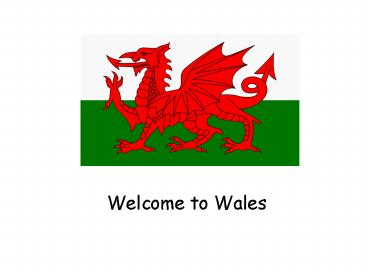Welcome to Wales - PowerPoint PPT Presentation
1 / 18
Title:
Welcome to Wales
Description:
After the Romans left Britain in the 5th century AD, marauding ... Welsh not considered a suitable medium for education during the heyday of the British Empire ... – PowerPoint PPT presentation
Number of Views:6118
Avg rating:5.0/5.0
Title: Welcome to Wales
1
Welcome to Wales
2
A quick history of Wales In the beginning
.......... The Celts arrived from Central
Europe
3
Birth of a language
After the Romans left Britain in the 5th century
AD, marauding Germanic tribes drove the Celts to
the north and west of Britain, to the Brittany in
France, and to parts of Spain. Separation of
the different Celtic settlements allowed local
dialects to evolve into distinct languages. Over
time, these developed into the Celtic language,
including Welsh.
4
The Celtic LanguagesSix of the Celtic
Languages survive today
- Q-Celtic
- Irish Gaelic
- Scottish Gaelic
- Manx Gaelic
- (Goidelic languages)
- P-Celtic
- Welsh
- Cornish
- Breton
- (Brythonic)
5
Scottish Gaelic
Manx Gaelic
Irish Gaelic
Welsh
Cornish
Breton
6
Original Britons!
- Wales was formed as the Celts were pushed back by
the Saxons. - The Celts spoke a common language and shared a
cultural unity, but society was tribal and
divided into six kingdoms. - When the Normans arrived in 1066, so began the
path to the conquest of Wales.
7
King Edward I became King of
England He spent a large part of his reign
subduing the Welsh princes and asserting his
authority with huge castles, such as Caernarfon,
Conwy and Harlech. He imposed English Law on the
Welsh Territories and invested his son as Prince
of Wales at Caernarfon in 1301.
1274
8
A National Hero
Owain Glyndwr
Owain Glyndwr was born in 1359 into a powerful
family of the Anglo-Welsh nobility, during a time
of relative peace between the tribes of Wales and
the English aristocracy.
By 1400 the future of the English monarchy was
uncertain. Owain Glyndwr began a revolt against
the English lords. In 1404, after many military
successes, he was crowned Owain IV of Wales and
laid out his vision of an independent Wales. For
six years, with help of the French and Bretons,
Owain held power and repelled the English.
9
The English Return
- Rebellion was finally crushed in 1412 bringing
to an end the fragile co-existence of the English
and Welsh. - The nationalist movement has always held Owain
Glyndwr in high regard. He is a figure of mass
culture in Wales, with statues and monuments
alongside pub and street names commemorating him.
10
(No Transcript)
11
The Welsh King of England
- By twists and turns of fate, the greatest
English royal dynasty began with a Welshman,
Henry Tudor. - Descended from the Princes of Gwynedd, he became
King Henry VII of England in 1485, and father of
the greatest of English Kings, Henry VIII.
12
Act of Union 1536
- Under Henry VIII
- Law of England imposed on Wales
- No Welsh to be spoken in the courts of Wales.
- Landowners and gentry increasingly used English
only. - Welsh gradually confined to working and lower
middle classes. - Wales was legally incorporated into England, and
English was its sole official language.
13
Down, but not out!
- Or, How the Bible saved the Welsh Language
1549 Elizabeth 1 passed Act of Uniformity which
required all worship to be in English. This
caused a rebellion in Cornwall and many deaths.
1563 Elizabeth passed legislation requiring
Welsh translations of the Bible and Book of
Common Prayer.
14
Welsh in print
- First book in Welsh printed in 1546.
- Between 1660 and 1730, around 545 books published
in Welsh. - Many religious works but also history and poetry.
- Non-conformist travelling teachers spread Welsh
literacy. - By 1750 Wales had a literate majority.
15
Welsh under threat
- The industrial revolution
- massive migration into Wales, diluted the Welsh
language majority through the 19th and early 20th
centuries.
- Mid 19th Century was a time of riots and unrest
in Wales. - Poor educational achievement
- Welsh not considered a suitable medium for
education during the heyday of the British Empire
16
Fighting Back
- Plaid Cymru founded in 1925 to seek
self-government, preservation of language and
culture of Wales - Civil unrest 1920 through 1980
- Welsh Language Society formed in 1926
- 1967 Welsh Language Act
- 1982 S4C Welsh Language Television Channel
launched - 1998 Government of Wales Act
- makes English and Welsh equal.
- 1999 Welsh Assembly created
- 1911 Census
- 43.5 population
- spoke Welsh
- Welsh is minority
- language
17
Famous Welsh Faces
- Find out more about Wales at
- http//www.bbc.co.uk/wales/
18
(No Transcript)































